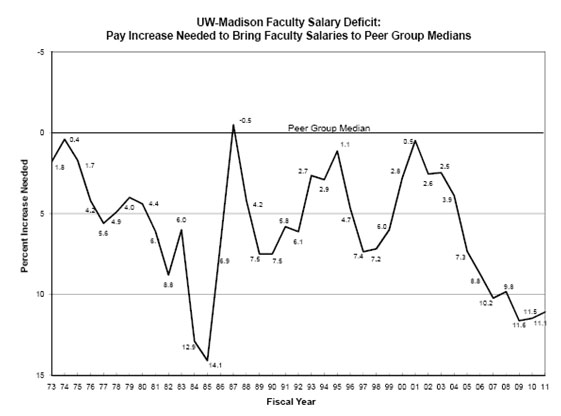At its core, a great university is successful because of people. Educators who inspire and challenge their students. Researchers doing cutting-edge projects that attract outside funding and drive our state’s economy. Academics committed to improving the lives of the people in our state.
Year after year, we get news that experts across the country and around the world consider UW-Madison a great university. For example, UW-Madison has perennially ranked among the top 20 universities in the world based on the Academic Ranking of World Universities. UW-Madison consistently ranks among the top three U.S. institutions as far as research money brought in and regularly places in the top ten of all institutions for doctorates conferred.
Some experts have said that an institution of worldwide caliber like UW-Madison really should not exist in a state like Wisconsin. We are not a large state in terms of population and we’re not particularly wealthy. In other words, UW-Madison’s status as an elite institution should not be taken for granted. We could easily slip from this lofty position.
UW-Madison Faculty Salaries: Falling Further and Further Behind In the past decade, UW-Madison faculty salaries have fallen, on average, 1% per year further behind the median average of peer institutions. UW-Madison now lies at the bottom of its peer group. Salaries for full and assistant professors fall 15.6% and 6%, respectively, below salaries at counterpart institutions. An overall pay increase of 13% is needed just to get us to the median of our peers.
The problem has been exacerbated by actions from the state. Furloughs and increased retirement and health care costs have had a big impact on take-home pay for faculty and academic staff, as they have for other state employees.
UW-Madison: Taking Proactive Internal Actions to Remain Competitive Despite the lack of state pay plans, UW-Madison has refused to stand pat in the face of stiff competition. In order to generate more revenue for salaries, the university has reallocated and redistributed funds from existing programs and not filled many positions vacated through departures and retirements. Unfortunately, these actions force us to cannibalize ourselves. The state-funded High Demand and Retention Fund has helped us fight off specific outside job offers, although those funds have now been eliminated from the state budget.
Futher action is being initiated. Chancellor Ward has created a Chancellor’s Educational Initiative to develop savings to be reinvested in our work force. The Huron Group project is finding additional savings. And more funding for salaries through philanthropy is also being pursued.
More Support and Flexibility Desperately Needed From the State The UW-Madison faculty implore state policymakers to recognize UW-Madison’s dire situation. We are truly at a breaking point. This great institution is seriously at risk.
The faculty recognize that the state is facing serious economic challenges and a major new infusion of state resources should not to be expected at this time. But as the economy improves and more revenue is generated, we would hope that UW-Madison and the UW System will again become a priority for the state.
In the meantime, the faculty ask that the state provide UW-Madison and other UW universities with more flexibility over tuition and enrollment policies. This will allow us to generate more revenue while ensuring that we maintain the access and affordability that the people of Wisconsin have come to expect. Ultimately, this will help ensure the continued success of UW-Madison and its fellow UW institutions.

